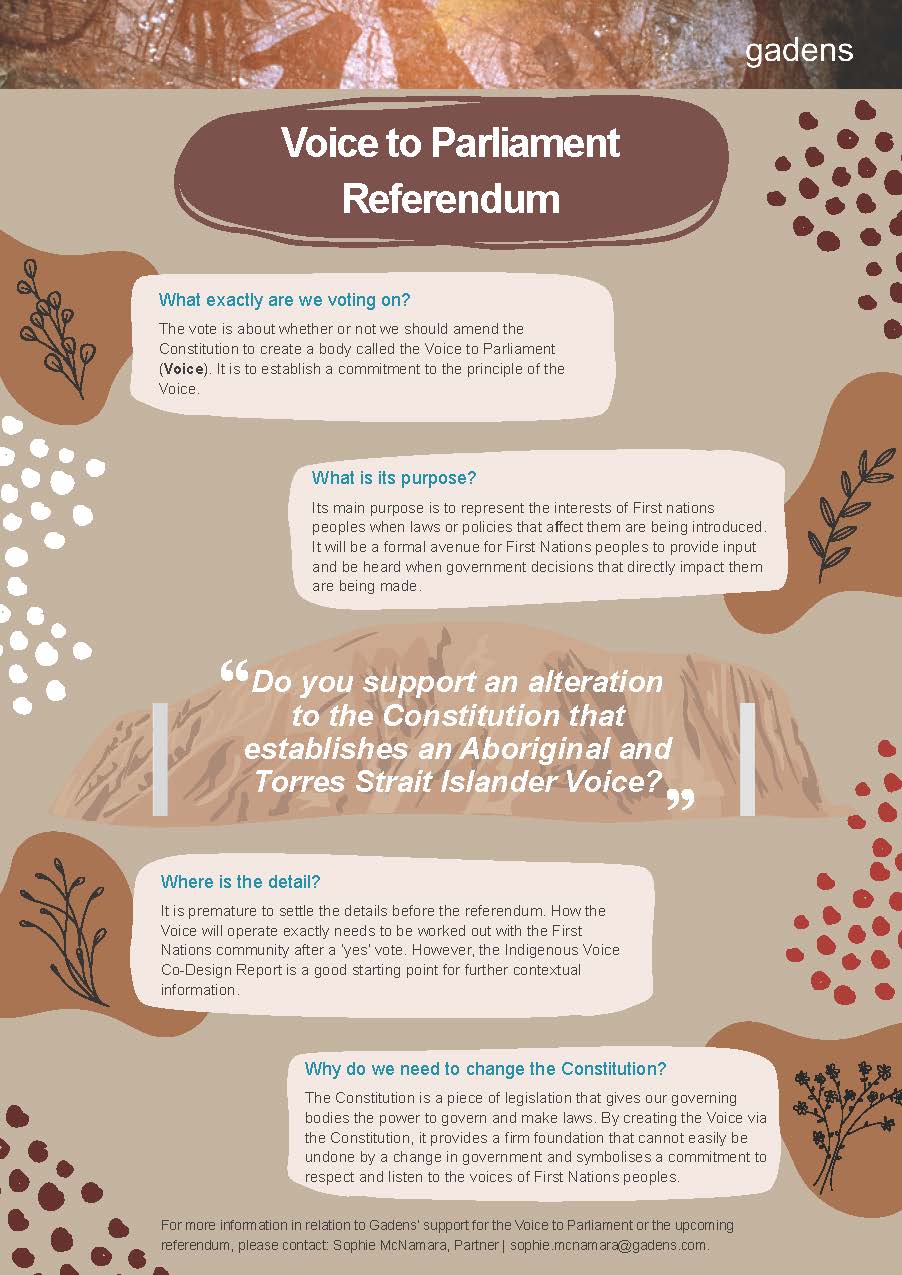-
Home > display-article > The Voice to Parliament | The upcoming referendum – Australia’s vote
The Voice to Parliament | The upcoming referendum – Australia’s vote
Later this year, Australians will vote on the Voice to Parliament referendum.
Australians will need to vote either ‘yes’ or ‘no’ to the following question:
A Proposed Law: to alter the Constitution to recognise the First Peoples of Australia by establishing an Aboriginal and Torres Strait Islander Voice. Do you approve this proposed alteration?
The Voice arose from the Uluru Statement from the Heart.
What is the Uluru Statement from the Heart?
The Uluru Statement from the Heart (Uluru Statement) is a petition that calls for three things: Voice, Treaty and Truth. This is proposed to be achieved through two key reforms.
- the establishment of a First Nations Voice to Parliament enshrined in the Constitution; and
- the establishment of a Makarrata Commission.
The Voice to Parliament will be an elected First Nations national representative body. The precise definition, structure and functions of this body will be determined by Parliament at a later stage if the referendum is successful. What we do know now is that the Voice will give the Australian Government an opportunity to make policies with First Nations peoples, rather than for them. The proposed functions of the body are:
- monitoring the making of laws that impact First Nations peoples;
- recognising the status of Aboriginal and Torres Strait Islander peoples as the first peoples of Australia; and
- contesting legislation that fails to adequately consider the rights and welfare of First Nations Peoples (though it is unlikely that the body will be given any kind of veto power).
The Makarrata Commission will be responsible for facilitating and supervising agreement-making between governments and First Nation peoples (i.e. treaties) and truth-telling about Australian history. Makarrata is a word from the language of the Yolngu people in Arnhem Land and as put by Noel Pearson:
The Yolngu concept of Makarrata captures the idea of two parties coming together after a struggle, healing the divisions of the past. It is about acknowledging that something has been done wrong, and it seeks to make things right.[1]
It’s envisioned that the appointment of individuals to the Makarrata Commission will be an open and transparent process with heavy community involvement. Naturally, it will mainly consist of First Nations Peoples. The general process is that there will be open nominations, followed by a public consultation before the Commissioners are formally appointed.
In the long term, the Makarrata Commission will have responsibilities to support institutional change, such as establishing an effective model of local truth telling, inquiring into matters of overarching national significance and recording and telling stories of survival and culture.
History leading to the Uluru Statement from the Heart and the Voice to Parliament
It should be recognised that the Uluru Statement is the product of a myriad of petitions dating as far back as 1933, multiple investigative reports and nationwide consultation with traditional owner groups, community groups and key individuals of both indigenous and non-indigenous backgrounds. Never, in the history of Australia, has another referendum involved this much consultation.
The Uluru Statement builds on a strong history of First Nations advocacy for justice and self-determination. For a detailed history, please visit the Uluru Statement website.
The referendum process
The plan is to enshrine the Voice to Parliament within the Australian Constitution. Any proposed amendment to the Constitution must be passed by a referendum. A referendum involves three key steps.
Step 1: A Member of Parliament introduces a bill to the Commonwealth Parliament proposing the change to the Constitution. The bill must receive 50% plus 1 votes in the House of Representatives, and 50% plus 1 votes in the Senate.
Step 2: If the bill is passed, the proposed change must be put to Australian voters in the form of a referendum within 2 to 6 months. During the time before the vote, Members of Parliament prepare arguments for and against the proposed change. The Australian Electoral Commission reviews these materials, then prepares the ‘Yes’ and ‘No’ cases for the proposed change to be posted to every Australian voter along with the wording of the proposed change.
Step 3: Australian voters vote either ‘Yes’ or ‘No’ for the proposed change on voting day. For the referendum to be successful, a ’double majority’ must be achieved. A double majority means:
- a majority of all Australians voted ‘Yes’; and
- at least four out of the six states had a majority of voters voting ‘Yes’.
Australia previously held a referendum to improve the rights and representation of Indigenous Australians in 1967. This referendum received overwhelming support from Australian voters, with nearly 91% of all Australians voting ‘Yes’.
Gadens’ position
At Gadens, we believe that there is an important role for lawyers and law firms to educate people about the significance of a ‘yes’ vote and to guide the discourse around the referendum.
We believe that the process of reconciliation is an ongoing journey and involves commitment and collaboration. At Gadens, we believe that reconciliation is important to our people, our clients, our community and Australia’s future.
As a firm, we support the Voice to Parliament referendum whilst still respecting an individual’s rights to hold their own views.
Authored by:
Carlyna Yap, Lawyer
Leo Rodrigo, Lawyer
Pearl Chen, Lawyer
Photo credit:
Carlyna Yap
[1] Noel Pearson, ‘Uluru Statement practical on indigenous recognition’, The Australian (online 27 May 2017) <http://www.theaustralian.com.au/news/inquirer/uluru-statement-practical-on-indigenous-recognition/news-story/05c70bfe1c91efb7504d70d386687400>.

